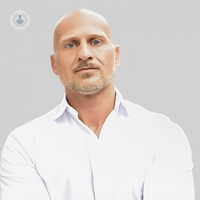Nasal polyps: Your expert guide to symptoms and treatment
Written by:In this informative guide, highly respected consultant ENT surgeon Dr Fabio Fanfoni sheds light on the most common symptoms of nasal polyps. The leading specialist also discusses approaches to treatment, and the associated potential risks and complications to be aware of.

What are nasal polyps?
Nasal polyps are soft, non-cancerous growths that develop inside the nose or sinuses, the hollow air-filled spaces around the nose. These growths are often shaped like teardrops and can form in clusters. They can obstruct the nasal passages and sinuses, leading to a variety of symptoms.
What are the symptoms of nasal polyps?
The most common symptoms of nasal polyps include:
- Stuffy or congested nose: This is the most common symptom, as polyps can block the nasal passages, making it difficult to breathe through your nose.
- Runny nose: Polyps can also cause excess mucus production, leading to a constant runny nose.
- Loss of smell or taste: The disruption of airflow caused by polyps can impair your sense of smell and taste.
- Postnasal drip: Mucus may drip down the back of your throat, causing a tickle or cough.
- Facial pain or pressure: In severe cases, nasal polyps can put pressure on the sinuses, leading to facial pain or pressure.
- Snoring or sleep apnoea: Polyps can obstruct the airway during sleep, causing snoring or even sleep apnoea.
How are nasal polyps treated?
Treatment for nasal polyps depends on the severity of symptoms and the patient's overall health. In some cases, lifestyle changes, such as avoiding allergens and irritants, may be sufficient to manage symptoms. However, for most patients, medication or surgery is necessary.
Medication
Nasal corticosteroids are the most common type of medication used to treat nasal polyps. These medications help to reduce inflammation and shrink the polyps. Other medications, such as antibiotics or antihistamines, may be used to treat specific symptoms, such as sinus infections or allergies.
Surgery
If medication is not effective or if the polyps are large and causing significant obstruction, surgery may be recommended. The goal of surgery is to remove the polyps and open up the nasal passages and sinuses. There are several different surgical techniques available, and the best approach will depend on the individual patient's circumstances.
What are the risks and complications of nasal polyps?
Nasal polyps are generally benign and do not pose a serious threat to health. However, there are some risks and complications associated with treatment, including:
- Recurrence of polyps: Nasal polyps can recur after surgery, especially if the underlying cause is not addressed.
- Bleeding: Bleeding is a common complication of nasal surgery, but it is usually minor and resolves on its own.
- Infection: Infection is another potential complication of nasal surgery, but it is relatively rare.
- Loss of smell or taste: In some cases, surgery can cause a loss of smell or taste. This is usually temporary, but it may be permanent in some cases.
Can nasal polyps be prevented?
There is no guaranteed way to prevent nasal polyps, but there are some things you can do to reduce your risk, such as:
- Avoiding allergens: If you have allergies, try to avoid your triggers as much as possible. This may include avoiding dust mites, pollen, pet dander, or other allergens that you are sensitive to.
- Controlling sinus infections: Sinus infections can contribute to the development of nasal polyps, so it is important to treat them promptly and effectively.
- Quitting smoking: Smoking can irritate the nasal passages and increase the risk of developing nasal polyps.
- Maintaining good hygiene: Practicing good hygiene, such as washing your hands frequently and avoiding touching your nose and eyes, can help to prevent the spread of germs that can cause sinus infections.
Can nasal polyps turn into cancer?
Nasal polyps are not cancerous, and they do not increase the risk of developing cancer. However, in rare cases, nasal polyps can be associated with a type of cancer called sinonasal lymphoma. This type of cancer is very rare, and it is usually treatable with surgery or radiation therapy.
When to see a doctor
If you are experiencing any of the symptoms of nasal polyps, it is important to see a doctor to get a diagnosis and discuss treatment options. Early diagnosis and treatment can help to prevent the polyps from getting worse and can improve your overall quality of life.
If you are seeking treatment for nasal polyps and wish to schedule a consultation with Dr Fanfoni, visit his Top Doctors profile today.


